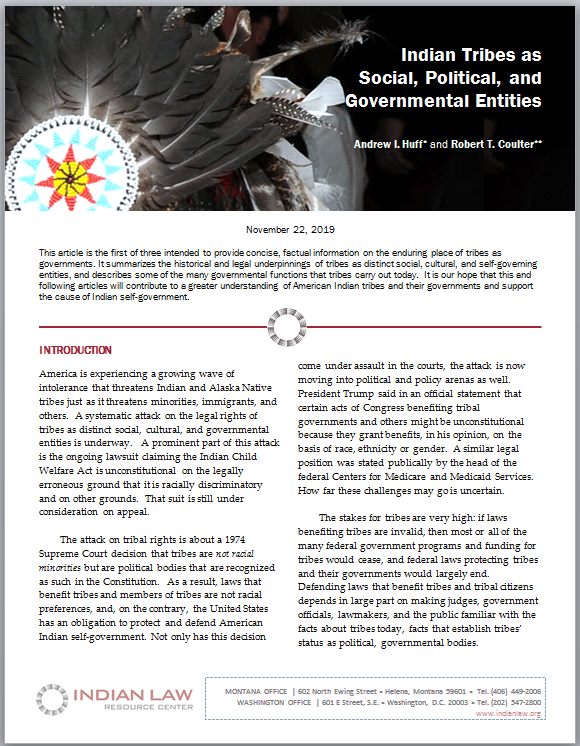In a few weeks the Fifth Circuit Court of Appeals will rehear arguments in Brackeen v. Bernhardt, a case challenging the constitutionality of the Indian Child Welfare Act by claiming – wrongly – that ICWA is racially discriminatory. The ongoing case is a prominent part of a systematic attack on tribal rights, especially one key principle of federal Indian law: tribes are political and governmental entities, not racial groups, and are recognized as such in the Constitution.
Despite the objections from tribes and federal attorneys, the Fifth Circuit decided to review Brackeen en banc, meaning there could be as many as 17 judges considering the case. En banc review is uncommon and usually reserved for unusually complex cases or cases of great significance. There is nothing particularly complex about Brackeen. The Supreme Court decided long ago that tribes are political bodies and not racial minorities. As a result, laws that protect and benefit tribes and members of tribes are not racial preferences; on the contrary, the United States has an obligation to safeguard and defend American Indian self-government.
It is true this case is hugely important for tribes and Native people. The stakes are very high: if laws like ICWA and others that protect the rights of Native peoples are ruled invalid as racial discrimination, then practically all laws and programs that benefit tribes would be eventually struck down, impoverishing countless tribes and weakening government to government cooperation on things like land and resource management, law enforcement, and much more.
The decision to review Brackeen en banc brings to the forefront one of the conclusions of Reclaiming Native Truth, a Native-led, two-year research project exploring public perceptions and misperceptions about Native Americans.
The lack of understanding about sovereignty extends to federal judges, who most likely have never taken an Indian law course in law school, yet routinely render major decisions affecting tribal nations and their citizens.
The assaults on the rights of Native peoples are not only taking place in the courts, they are building in political and policy arenas as well. Defending laws that benefit tribes and tribal citizens depends in large part on making judges, government officials, lawmakers, and the public familiar with the facts about tribes today, facts that establish tribes’ status as political, governmental bodies.
“Indian Tribes as Social, Political, and Governmental Entities” is the first in a series of three articles we are producing to provide factual information on the enduring place of tribes as governments. The article summarizes the historical and legal underpinnings of tribes as distinct political, cultural, and self-governing entities, and describes some of the many governmental functions that tribes carry out. We draw together some of the more important facts about tribes as they are now. There is a real need to educate people about the present day realities of tribes, because, by almost every measure, tribes, tribal governments, and Indian and Alaska Native communities have changed greatly and grown stronger in the last few decades. This overview of tribal governments today gives factual support to the status of tribes as governmental, political bodies.
The second and third articles will explore in greater detail the relationship between tribes and the federal government and the states, including how tribes operate today as modern governments alongside the federal and state governments. It is our hope that these articles will contribute to a greater understanding of American Indian tribes and their governments and provide informational tools that can be used by those who support the cause of Indian self-government.

